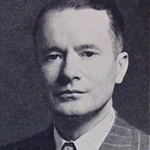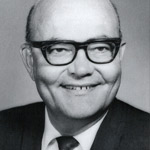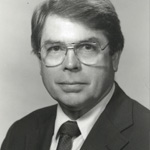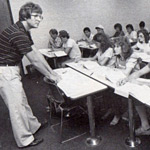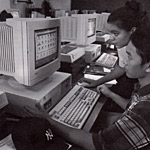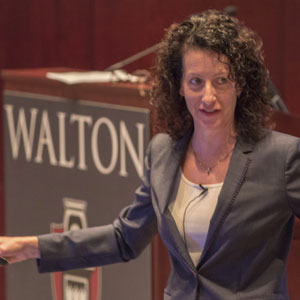Mission, Vision, and History
Mission
The mission of the Sam M. Walton College of Business is to advance and disseminate business knowledge using a diverse, inclusive, and global perspective and to encourage innovation in our primary strategic endeavors: Retail, Data Analytics, and Entrepreneurship.
Values
Excellence: We are driven to be the best in everything we do.
Professionalism: We operate with integrity, humility, respect, and inclusion.
Innovation: We imagine possibilities, we create, and we inspire others.
Collegiality: We respect each individual, we value our differences, and we welcome all.

Vision
Through our teaching, research, and service, the Sam M. Walton College of Business will be a thought leader and a catalyst for transforming lives in Arkansas, the United States and the world.
Credo
Read the Walton Credo. Our Credo is a statement of beliefs, values, and principles that guide our actions and decisions.
Historical Timeline
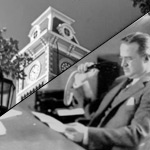
1926
The School of Business Administration opens it's doors on the 3rd floor of Old Main.
Charles C. Fichtner, the first dean, presides over 21 students, and four faculty members.
The School offers thirty-six courses in business administration, economics and sociology.
Curricula are available in accounting, banking and finance, general business, industrial management and marketing.
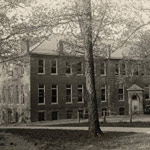
1928
The School of Business moves to the old College of Engineering building, which is renamed the Commerce Building
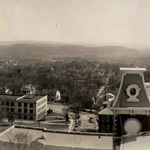
1931
American Association of Collegiate Schools of Business Administration (now titled the Association to Advance Collegiate Schools of Business – AACSB International) accreditation is awarded to the undergraduate degree program.
School of Business renamed the College of Business Administration
Tuition: $25/semester
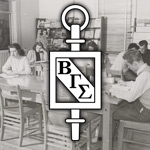
1932
A University of Arkansas Alpha chapter of Beta Gamma Sigma is founded, the oldest and most prestigious academic honor society for business students.

1937
The Guild Ticker, a publication established by the Commerce Guild, is also known as the Ticker. Although its purpose is primarily for students, it is sent to various industries in Arkansas. The Commerce Guild and Guild Ticker continue to be a tradition until the mid-1960s.
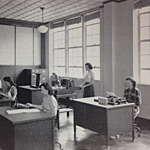
1943
Bureau for Business and Economic Research is formed, to engage in grants and contracts for federal, state and local government research and to provide support for faculty research.
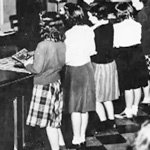
1944
Wartime enrollment dips to 195, down from approximately 500 business students in 1941.
Female business students outnumber male students 2:1 during the 1944-45 school year.
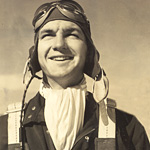
1946
Post-war enrollment exceeds 700 students for the 1946-47 school year.
Among 700+ students, 420 are returning veterans.
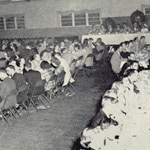
1950
Doctor of Philosophy in economics established
MSBA degree re-designated as Master of Business Administration (MBA)
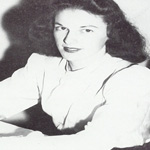
1951
The Alpha Iota Chapter of Beta Alpha Psi, an honorary accounting fraternity, is installed by Professor Doris Cook.
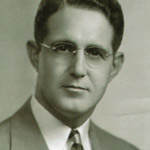
1954
Finance Professor Harold A. Dulan, Law Professor E.J. Ball, and MBA graduate Lewis Callison create the nations first commercial variable annuity life insurance company and sell the first commercial variable annuity ever offered to the U.S. public.

1963
MBA degree accredited by the AACSB during the first year of accreditation of any masters program.
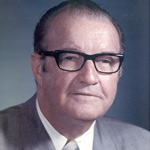
1971
Professor Robert Kennedy starts portfolio management class with $100,000 fund established by Raymond Rebsamen. It becomes one of the oldest, best funded and most comprehensive portfolio management classes in the country.
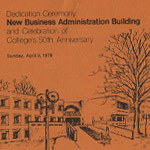
1978
Walton College moves to its present location on Ozark Avenue. Business Building (WCOB) completed at a cost of $5 million.
Bessie B. Moore Center for Economic Education formed, to provide economic education and understanding to elementary and secondary school teachers.

1979
Small Business and Technology Development Center is formed, to counsel and train small business owners and managers on sound business practices, and new business techniques.
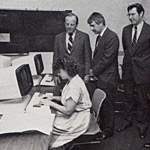
1984
Center for Executive Education is formed, to provide continuing education for middle and upper level managers

1993
Intensive strategic planning, involving faculty, staff and students, began with aid of Andersen Consulting
First College “block party” held to welcome new and returning students
Dean Doyle Z. Williams hired from USC. Goals for diversity, enrollment growth, entrepreneurship, stakeholder ties, global economy and organizational productivity
Capital Campaign for Arkansas announced

1994
Honors Banquet established to annually recognize outstanding students and faculty, and later, staff and alumni
Distinguished Speaker Series established to expose students, faculty and staff to thought leaders in business and politics
Dean’s Executive Advisory Board established as a forum for feedback from the business community
Master of Science in Accountancy redesigned and renamed the Master of Accountancy (MAcc)
Academic standards increased and assessment methods proposed
Faculty and student breakfasts held monthly with Dean for information, sharing and networking
International Programs office created to advance strategic goal of globalization
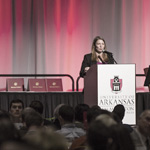
1995
Undergraduate Curriculum and Assessment Committee and Masters Advisory Committee established
Business Alumni Advisory Council created to serve as ambassadors for the Walton College
Dean’s Student Advisory Board established to represent students’ concerns to college administration
Expanded program to offer the business degree and a business minor through night and summer classes
Business Forecast Luncheon created to engage business community on economic issues
Department chair positions created with renewable five-year appointment terms
Accounting Careers Awareness Program developed for minority high school seniors to increase diversity of enrollment
Vision 2000 adopted
College received Arkansas Commitment to Quality Award

1996
Major changes to accounting curriculum and new MBA framework proposed
Walton College Career Center established.
Supply Chain Management Research Center formed, to provide a direct link between the private sector and University of Arkansas supply chain resources
Major gift of $6.7 million announced to build Reynolds Center for Enterprise Development to support outreach and economic development
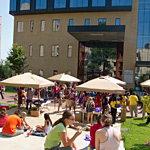
1997
Faculty Personnel Document establishes expectations for faculty teaching, research and service
UA Board of Trustees passes a resolution supporting S.A.K.E., Students Acquiring Knowledge through Enterprise.
AACSB accreditation renewed for business and accounting
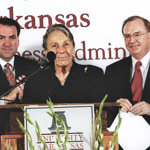
1998
A $50 million gift, the largest upfront cash gift ever given to a public business college, is given by the Walton Family Charitable Support Foundation for student and faculty endowments, research centers, technology and other needs
College named Sam M. Walton College of Business Administration
Opening of the Donald W. Reynolds Center for Enterprise Development, a conference center.
Center for Retailing Excellence formed, to focus on research and the development of students as future leaders in the retailing and related industries
Freshman Business Connections implemented as a first-year experience to increase student retention
Established Students in Free Enterprise (SIFE) chapter established to teach students leadership, teamwork and communication skills
Business Giants Forum established to allow student interaction with CEOs in a question and answer format
Differential tuition approved for graduate students
Graduate School of Business is created to oversee all Master and Doctoral programs in the Business College.
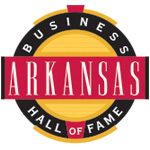
1999
Information Technology Research Center, and the Honors Program, are established.
College ranked 48th in public undergraduate business schools in U.S. News and World Report ranking
Branding exercise pursued with external consultants to increase recognition of College
Arkansas Business Hall of Fame launched to recognize exceptional Arkansas business leaders
Renovated College classrooms to provide standard suite of technology in each classroom

2000
Bachelor of Science in International Business introduced
College tied for 36th in public undergraduate programs in U.S. News and World Report ranking
S.I.F.E. Team places first in world for “BizWorld” program
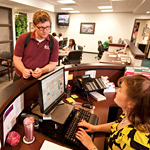
2001
Planning began for increasing admission standards over a period of years
Plans developed for new graduate business building
Students win Arkansas Governor’s Award for Entrepreneurial Development competition
Vision 2005 adopted
Campaign for Twenty-First Century announced
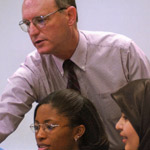
2002
Proposal developed to form Business Alumni Society
Technology gifts from IBM, NCR, and SAP helped expand the enterprise computing curriculum
U of A received $300 million gift from Walton Family Charitable Support Foundation
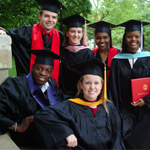
2003
Lead gift of $8 million for Graduate Business Building announced
Received Department of Justice and NSF awards totaling $1.1 million
College tied for 28th in public undergraduate programs in U.S. News and World Report ranking
Entrepreneurial Spirit Forum created to engage students with entrepreneurs
Proposal developed to change Managerial MBA to blended online format
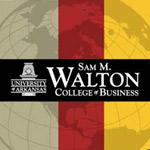
2004
College tied for 25th in public undergraduate programs in U.S. News and World Report ranking
Dean Doyle Z. Williams elected to chair AACSB International
Walton College Credo adapted
Plans developed for strengthening doctoral program
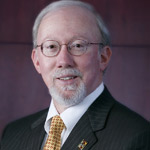
2005
MBA program ranked 45th by U.S. News and World Report ranking
National search initiated for new dean after Doyle Z. Williams announces retirement
Walton College and the Department of Accounting are reaccredited by AACSB International
UA Campaign for the Twenty-First Century completed with a total of $1.046 billion in gifts and pledges
Dr Dan Worrell becomes Walton College Dean

2007
Willard J. Walker Hall is opened, made possible by an $8 million lead gift from the Pat and Willard Walker Charitable Foundation.
J.B. Hunt Transport Services Center for Academic Excellence is opened, funded by a $10 million gift from J.B. Hunt Transport Services Inc.
Garrison Financial Institute created, to advance financial education and knowledge through practice.
Tyson Center for Faith and Spirituality in the Workplace is formed, to work with students, faculty and the business community to embrace faith and spirituality in the workplace
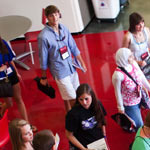
2011
Department of Supply Chain Management is established.
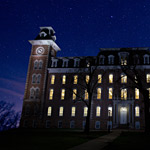
2014
Fully online program becomes available for Bachelor of Science in Business Administration.
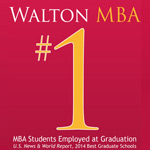
2015
Walton MBA program ranks number one in the nation for percentage of students employed upon graduation, as reported by U.S. News and World Report in 2014 and 2015.

2016
Dr Matthew Waller becomes Walton College Dean
McMillon Innovation Studio, an interactive, open-to-the-public university retail lab is created, funded by a $1 million gift from Doug and Shelley McMillon

2017
Brewer Hub opens on the Fayetteville square, serving as collaboration and co-working space to train new and early stage entrepreneurs.
$7 million gift to create the Supply Chain Policy Initiative
Online Accounting degree is created.
Online Supply Chain Management degree is created.
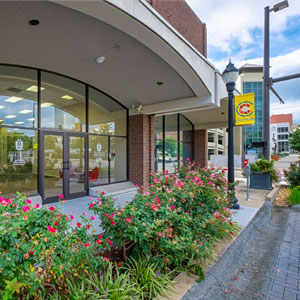
2019
Walton College Executive Education begins delivering courses at its new Little Rock location in the River Market District at 2nd & Main
$1 million gift from Doug and Shelley McMillon to scale the McMillon Innovation Studio
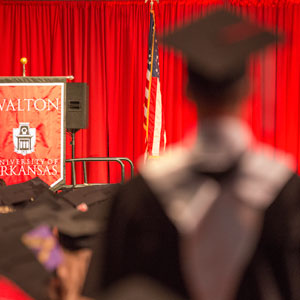
2020
Department of Strategy, Entrepreneurship and Venture Innovation established.
Supply chain management undergraduate program ranked # 1 in North America by Gartner, the leading global research firm.
$10 million endowment creating the William Dillard Department of Accounting
New masters programs established: Master of Science in Economic Analytics, Master of Professional Accounting, Master of Applied Business Analytics, Master of Supply Chain Management, Master of Science in Finance.
Business Integrity Leadership Initiative created.
Council for Supply Chain Professionals locates the Supply Chain Hall of Fame to Rogers, AR, under the stewardship of Walton College. Physical space provided by the generous support of Johnelle Hunt and the Blass family.
Blockchain Enterprise Systems concentration approved for the Enterprise Systems Graduate Certificate program.
J.B. Hunt Transport Services Inc. gives $2.25 million for collaboration to increase awareness of inclusion and diversity in transportation and logistics and explore new, sustainable solutions to address current and potential industry challenges.

2021
Walton College passes an enrollment level of 7,100 students.
$4.1 million gift from the Walton Family Charitable Support Foundation to help create an entrepreneurial culture surrounding outdoor recreation for students, innovators, startups and small businesses.
Greenhouse Outdoor Recreation Program launched.
Fully online degree programs created for human resources management and marketing.
Customer Centric Leadership Initiative is established.
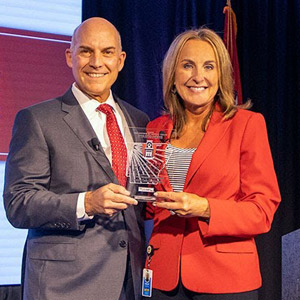
2022
AACSB accreditation renewed for business and accounting
Supply chain management undergraduate program again ranked # 1 in North America by Gartner, and Supply Chain Management Master's program ranked #2 in North America.
Supply Chain Department officially renamed the J.B. Hunt Transport Department of Supply Chain Management, recognizing significant and continued support from J.B. Hunt Transport, Inc.
New graduate degree program established: The Robert L. Shoptaw Master of Healthcare Business Analytics Program, in cooperation with Arkansas Blue Cross and Blue Shield and the College of Education and Health Professions.
New graduate degree program established: Master of Science in Product Innovation

2023
New graduate degree program established: Master of Science in Marketing
Guild Partnerships established to provide educational opportunities for employees of Walmart, Sam's Club, and Tyson Foods.
Princeton Review adds Walton MBA program to its Best Business Schools list, and ranked the graduate entrepreneurship program as #1 in the SEC and #4 in the South.
New DNP-EMBA dual degree program program established in partnership with the College of Education and Health Professions, preparing advanced-practice nurses with leadership experience to take on executive positions in healthcare.
Leadership History
Together, with a strong faculty and excellent students, these administrators have each forwarded the Walton College's dedication to continued academic excellence.
- Dean Charles C. Fichtner (1926-1940)
- Dean Karl M. Scott (1941-1943)
- Dean Paul W. Milam (1944-1966)
- Acting Dean Merwyn G. Bridenstine (1966-1967)
- Dean John P. Owen (1967-1983)
- Dean Lloyd Seaton (1983-1989)
- Dean Stan Smith (1989-1992)
- Interim Dean Thomas McKinnon (1992-1993)
- Dean Doyle Z. Williams (1993-2005)
- Dean Dan L. Worrell (2005-2012)
- Dean Eli Jones (2012-2015)
- Dean Matthew A. Waller (2015 to 2023)
- Dean Brent Williams (2023 to present)
The "Epic" of Walton College
The story of the Sam M. Walton College of Business at the University of Arkansas doesn’t begin or end with the historic $50 million gift from the Walton Family Charitable Support Foundation. That watershed moment in 1998, however, has proven to be a fitting tribute to our past, a solid foundation for our present, and a significant springboard toward our future. Former faculty, staff, students, and donors helped build a college worthy of the largest upfront cash gift ever given to a public business school at that time. At the same time, the gift provided the much-needed resources for unprecedented growth and recognition as a nationally competitive college. And with our footings solidly in place, the Walton College is perfectly positioned to become a top-tier public business school. This is the story of how we got where we are and how we plan to get where we’re going.
Our Roots
The Walton College traces its roots to 1926 when Harvard graduate Charles Fichtner helped form the University of Arkansas School of Business Administration and became its first dean. Four faculty members and 21 students met that year on the third floor of Old Main, where curricula were available in accounting, banking and finance, general business, industrial management, and marketing. The college grew over the decades, adding more and more students, faculty, and offerings. It added its first Master’s degree in 1930, and it became the College of Business Administration in 1931 when the undergraduate program was accredited by the American Association of Collegiate Schools of Business Administration (now the Association to Advance Collegiate Schools of Business, or AACSB).
Today, the Walton College offers nine undergraduate majors, multiple Master’s and Ph.D. programs, and occupies four different buildings—Willard J. Walker Hall, the Business Building, the Donald W. Reynolds Center for Enterprise Development, and the J.B. Hunt Transport Services Center for Academic Excellence.
As enrollment grew, so did the alumni base and the support that came from successful graduates.
One of those was Barney Lewis, Class of 1934. The Helena, Ark., native operated a string of successful furniture stores around the state, and his $100,000 donation to the business school helped pave the way for our Leadership Walton program.
Other donors established chairs to support outstanding faculty members such as James Millar (Dillard Chair in Finance, 1985); John Ozment (Oren Harris Chair, 1991); Paul Cronan (Matthews Chair, 1991); John Dominick (Bellamy Chair, 1986); and Scot Burton (Wal-Mart Chair in Marketing, 1993).
In 1996, a $6.7 million grant from the Donald W. Reynolds Foundation funded the Reynolds Center for Enterprise Development. The donation not only supported the college’s efforts for outreach and economic development, but it provided additional momentum for the Walton investment two years later.
The Walton family saw an opportunity in 1998 for the business college to move to an even higher level of sustained excellence. In fact, in explaining the vision behind the $50 million gift, the foundation noted that it’s “sole purpose” was for the college to “become nationally competitive.”
Over the next 20 years, that vision has become a reality. The gift has enabled us to attract world-class faculty, upgrade our facilities and technologies, create programs that attract outstanding students, and support these students by helping them identify internships and jobs with top companies in Arkansas, the U.S., and around the world.
It has allowed us to fund research, create new endowed positions that attracted top researchers, develop outreach centers such as the Garrison Financial Institute, develop a worldclass Trade Center, expand the student-management investment fund from $1 million to $11 million, and create our Global Engagement Office.
The gift also helped establish the Walton College Honors Program, provided scholarships and Walton Fellowships to deserving students, established a state-of-the-art behavioral business research laboratory, and created the Office of Diversity and Inclusion.
A ripple effect of the gift was that it inspired other donations—including a $300 million donation in 2002 from the Walton Family Charitable Support Foundation to the University of Arkansas. This gift came in part because the Walton College’s stewardship of the $50 million donation gave the foundation confidence that the university as a whole could replicate our model.
The Walton College also benefited because the campus-wide gift included matching funds for endowed positions and the establishment of the Honors College. Those matching funds encouraged other donors to contribute to the college and become vital parts of our story.
Enrollment for the Walton College has continued to grow, especially in the years since the Walton donation. The college had 6,468 students in 2018, up from 3,396 in 2006. That’s a 90.5 percent increase over those 12 years.
Where We Stand
To fully appreciate the state of the Walton College in 2019, it’s worth looking more deeply at a few specific accomplishments.
- The Walton College is ranked first in information systems research. The Department of Information Systems has four of the most-cited scholars in information systems.
- The Walton College is also ranked in the top ten in auditing and accounting information systems research and in supply chain management research.
- The Department of Marketing has built strong research in retail, as well as research on food and nutrition policy related to retail packaging and labeling. 4
- Experimental and behavioral economics, a strategic focus of the Department of Economics, has been aided by the college’s Behavioral Business Research Laboratory (BBRL), a world-class facility where researchers study a variety of business and economic topics, including strategic behavior, worker-employer relations, information processing, group problem-solving, and decision-making under uncertainty.
- The Department of Economics also has ongoing research projects in such countries as Indonesia, Uganda, India, Mozambique, and China.
- The Department of Information Systems differentiates its professional and full-time Master in Information Systems and undergraduate programs from other information systems programs through hands-on application of concepts that use many of the enterprise systems used in leading organizations and real-world data sets from several industry partners. The Walton College, for instance, is a part of the SAP University Alliance, which gives us access to SAP R/3 software and licensing and allows students to use SAP ERP software both in and out of the classroom. We also use this in our interdisciplinary minor in Enterprise Resource Planning (ERP), and we host workshops that give students the opportunity to obtain an industry recognized SAP certification.
- The Walton Business Communication Lab, established in 2011, has held more than 8,000 tutoring sessions to improve students’ oral and written communication skills and increase both their in-class performance and their career readiness. Additionally, the lab began working with Walton Executive Education in 2017 to create online programming and inperson workshops to strengthen the business communication skills of professionals across the state.
- The Bessie Moore Center for Economics, which was established in 1978, is equipping teachers to develop the entrepreneurial mindset in K-12 students with special initiatives in underrepresented regions.
- Students in the Department of Marketing are engaged in transformational educational experiences involving class projects in places such as the Arkansas Delta, villages in Belize, and the jungles of Vietnam.
- The Department of Marketing also collaborates closely with industry representatives each semester to provide experiential learning opportunities and build work-ready skills in category management and through sales competitions. Through a multi-year national 5 grant, for instance, marketing students are learning to manage the promotions for a project aimed at reducing alcohol consumption on college campuses.
- The Center for Business and Economic Research (CBER) serves as an economic development catalyst for the state by performing research on economic and public policy questions affecting the state’s public and private entities. It provides economic data, analysis, and forecasts in a variety of public settings, including an annual business forecast luncheon and state and regional economic reports.
- The Walton College is a leader in business sustainability research and education through the Sustainability Consortium (TSC), a global organization that helps make consumer products more sustainable. TSC was founded by the UA in partnership with Arizona State University using seed money from a Walmart donation. It now has four offices around the world, including one in Fayetteville.
- Investments in our research centers has led to an unparalleled level of connectivity with industry partners. Our enhanced corporate connections and networks have been integral in initiating the university’s sustainability programs. The new business analytics programs use these same networks and connections to bring important resources and external awareness to the university. The Walton-initiated entrepreneurship program is having a significant impact on the commercialization of scientific and engineering inventions, benefitting both the university and the state.
- The Garrison Financial Institute, which was founded in 2005, now includes three classes that oversee student-managed investment funds totaling more than $11 million. That includes the Rebsamen Trust, which was created in 1971 with a $100,000 gift from the late Raymond Rebsamen of Little Rock to form the third-oldest portfolio class of its kind in the country. The market value of the portfolio now stands at more than $1 million, with an additional three funds that total $5 million. Returns support finance internships, scholarships, and the endowment for the Robert E. Kennedy Chair in Finance.
- The Walton College established the Arkansas Business Hall of Fame to honor, preserve and perpetuate the names and outstanding accomplishments of business leaders who have brought lasting fame to Arkansas. Four new members have been added each year since 1999. The Hall of Fame is easily accessed from the lobby of the Donald W. Reynolds Center for Enterprise Development.
Where We're Going
Clearly, the health of the Walton College has never been better. The faculty, staff, and administrative team at the Walton College takes great pride in our role as stewards of the legacy we’ve inherited. And we’re acutely aware that success breeds success, so we’re not just content to ride the coattails of others.
We’re committed to building the strongest platform of any business school for global thought leaders and internationally recognized faculty. We are charging into a bigger, brighter future that we believe will write new chapters in this story and allow us to fully live our mission, vision, and values. The drive to get there has created new opportunities. They are the types of opportunities we want, but they are still opportunities.
Our rising prestige has made us attractive to undergraduate, graduate, and professional students, so we need to grow our faculty and create and implement new programs.
We also have innovative online programs, so we need information technology to enable maximum impact. And we have a record-setting graduate program in entrepreneurship, so we need to expand faculty, staff, and student fellowship resources.
We are positioned to be propelled into the top echelon of public business schools. Here are some ways we see this part of our story developing:
- In 2019, we began the process of creating the Department of Strategy, Entrepreneurship and Venture Innovation (SEVI). Previously, innovation, entrepreneurship, and strategic management were included in the Department of Management, along with organizational behavior and human resource management. Creating two distinct departments allows professors and students in each discipline to thrive in alignment with our broader vision and goals.
- By expanding on our unique industry relationships and our internationally recognized model for cross-disciplinary entrepreneurship education, we can create one of the world’s most vibrant entrepreneurial ecosystems. Our approach to entrepreneurship involves much more than offering a curriculum that teaches business theory and best practices to students who want a career in business. The Office of Entrepreneurship and Innovation has worked with faculty and students from the College of Engineering, the College of Arts and Sciences, the College of Agriculture, the School of Nursing, and, of course, the Walton College of Business. Our New Venture Development Program began in 2006 with a focus on combining business with the disciplines of science, technology, engineering, and math. We have been so successful in this effort that we’ve added similar programs around social entrepreneurship and arts entrepreneurship. As we extend the university’s growing research base by providing world-class training, tools, mentor networks, and acceleration opportunities for faculty, staff, students, and alumni, we will develop and incubate their ideas into commercially viable opportunities.
- Expanding programming in innovation spaces such as the Brewer Family Entrepreneurship
Hub and the McMillon Innovation Studio allows students and faculty from across our
campus to conduct cutting-edge research, test emerging technologies, build new business
models, and engage with industry, investors, and the entrepreneurial community.
- The McMillon Innovation Studio supports creativity, entrepreneurship, and collaboration between all disciplines on campus. It is run by students for students and offers innovation space, design challenges, tools, resources, and workshops. Teams focus on prototyping new models of delivery, services, products and policies in the areas of health and well-being, supply chain, and seamless commerce.
- The Brewer Family Entrepreneurship Hub opened in 2017 as an interdisciplinary collaboration venue, co-working space, and training center for new and early stage entrepreneurs in Northwest Arkansas. It’s located on the square in Fayetteville and is used by UA students, faculty, and alumni entrepreneurs, many of whom are creating and advancing new knowledge-based ventures in Northwest Arkansas.
- We hosted our first Blockchain Hackathon in 2017, pushing the limits of blockchain technology with a series of six cases set by local industries. And we established the Blockchain Center of Excellence in the Department of Information Systems in 2018. Our vision is to make the Walton College a premier academic leader in advocating for and educating on blockchain applications. With seed money from the governor of Arkansas, we hired a director, associate director, and senior managing director, onboarded ten corporate advisory board members, launched a white paper research series, delivered public blockchain events for students and practitioners, and developed undergraduate and graduate blockchain curricula.
- The Center for Business and Economic Research (CBER) is poised to expand its support of economic development efforts by partnering with state and regional chambers of commerce and other economic development organizations to bring the center’s expertise to all 75 counties in Arkansas.
- Our vision is to make the Walton College a premier academic leader in business analytics. The Department of Information Systems offers a certificate in business analytics and is creating a Master in Applied Business Analytics. Another ongoing project in this area is to partner with the College of Engineering and the Fulbright College of Arts and Sciences in the development of a premier data science undergraduate major.
- The Walton College is committed to identifying and addressing all of the areas that
contribute to the success of our students. The Office for Strategic Information and
Effectiveness (OSIE) and the Undergraduate Programs Office (now Student Success) are
key in these efforts. They are working on predictive models to identify students who
are at-risk of attrition. These models will provide advisors with information on not
only which students are at risk, but also the major factors that are contributing
to that risk. This information will assist advisors in tailoring both program- and
individual-level interventions to assist in increasing retention in the college. These
models also will help inform the campus community on ways to use modern analytics
to address student success. Some of the efforts already underway include:
- Proactive efforts to manage class size in relation to student demand and override issues has eliminated the need for an estimated 200 students to come to the office.
- Changes to the advising appointment website clarified students’ needs for advisors.
- Creation of a form that students complete while they are waiting for their appointment helps students articulate their requests and makes it easier to get down to business in the advisor appointment.
- The Student Success staff talks to students in the waiting area or in line to identify those who can handle their issues online or via some other means.
- We are working closely with several of our community college partners across the state to align our curriculum and build articulation agreements. These efforts create a seamless transition for students to transfer from an Arkansas community college to Walton for both our face-to-face and online degree programs.
- With an ever-changing job market, we are working closely with employers and advisory boards to understand the career readiness skills, competencies, and experiences our students need to be successful in their internships and professional careers. We have made an investment in the technology and career readiness programming to support students in building their individual portfolios and to articulate their personal stories.
With greater resources, we also can expand our footprint throughout the state, reaching more students and business leaders, and, thereby, offering and generating more opportunities and transforming more lives.
As the flagship business school of the state, it’s critical that we holistically engage the entire university system and the Arkansas business community. One of the ways we are doing this is with the Walton Executive Education Center in Central Arkansas. The center – known as Walton College at 2nd & Main – provides state-of-the-art facilities for targeted programs. This hub uses the newest learning and communication technologies to link industry clusters throughout Arkansas and the world, connecting legacy companies and systems to students and startup talent.
It provides opportunities to partner with other in-state educational institutions such as the University of Arkansas at Little Rock (UALR), the University of Central Arkansas (UCA), Arkansas State University (ASU), and University of Arkansas for Medical Sciences (UAMS).
Our joint Walton College and UAMS Executive MBA program, for instance, has an emphasis in healthcare.
The center allows us to provide underrepresented student groups throughout the state with access to the resources and services of the flagship university. It enables us to build a bridge between the vibrant entrepreneurial communities in northwest and central Arkansas. And it provides companies throughout that region access to world-class, customized executive education programs, helping them to strategically invest in their workforce.
Getting There Together
The mission and vision of the Walton College are clear, and we’re excited about and confident in our plan for achieving them. But we understand that we didn’t arrive where we are on our own and we won’t continue to move forward without alumni and other partners.
With their support, we can build on our strengths. And through our teaching, research, and service, we will expand our reach and reputation as a thought leader and a catalyst for transforming lives in Arkansas, the United States and the world.

